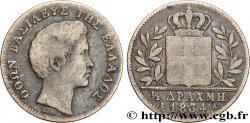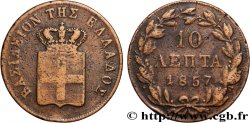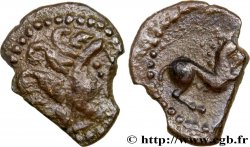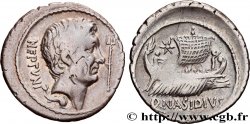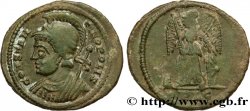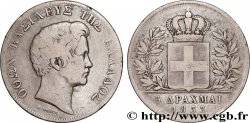Live auction - fwo_1040958 - GRÈCE - ROYAUME DE GRÈCE - OTHON 5 Drachmes 1833
Devi Sign-in ed essere un offerente approvato fare un'offerta, Login per fare offerte. Conti sono soggetti ad approvazione e di approvazione sono raggiunti entro 48 ore. Non aspettare fino al giorno di una vendita si chiude per registrarti.Confermando la tua offerta su questo oggetto ti impegni ad un contratto legalmente vincolante per l'acquisto di questo prodotto e fare clic su «offerta» costituisce accettazione dei termini di utilizzo de live auctions cgb.fr.
Offerta deve essere collocato in euro gli importi interi vendita only.The si chiuderà al momento sulla descrizione dell'oggetto, eventuali offerte pervenute al sito dopo l'orario di chiusura non verranno eseguite. Volte transmition possono variare e le offerte potrebbero essere respinto se si attende per gli ultimi secondi. Per ulteriori informazioni ckeck le FAQ Live auction.
Le offerte vincenti saranno sottomesse ai 18% per spese di compartecipazione alla vendita.
Le offerte vincenti saranno sottomesse ai 18% per spese di compartecipazione alla vendita.
| Valutazione : | 120 € |
| Prezzo : | 72 € |
| Offerta maxima : | 72 € |
| Data di fine vendita : | 22 luglio 2025 20:08:02 |
| partecipanti : | 3 partecipanti |
Tipo : 5 Drachmes
Data: 1833
Quantità coniata : 378000
Metallo : argento
Titolo in millesimi : 900 ‰
Diametro : 38 mm
Asse di coniazione : 6 h.
Peso : 21,50 g.
Orlo : striée
Grado di rarità : R2
Commenti sullo stato di conservazione:
Coups sur tranche
N° nelle opere di riferimento :
Diritto
Descrittivo diritto : Tête nue d'Othon Ier à droite ; au-dessous signature en grec K. VOÏGT.
Legenda diritto : OQON BASILEUS THS ELLADOS
Traduzione diritto : (Othon roi des Hellènes).
Rovescio
Descrittivo rovescio : Écu couronné entre deux branches d'olivier.
Legenda rovescio : 5/ DRACMAI/ 1833
Traduzione rovescio : (5 drachmes).
Commento
Ce type fut fabriqué à Paris et Athènes en 1833, 1844 et 1845.
Pour résoudre l’anarchie qui menaçait la Grèce nouvellement indépendante, les puissances occidentales choisissent Otto von Wittelsbach, deuxième fils de Louis Ier de Bavière pour diriger la Grèce. Couronné en 1833 sous le nom d’Othon, il se révelera incapable de gouverner démocratiquement et ne se convertira jamais à l’orthodoxie. Il fut renversé en 1862 par un coup d’état militaire et remplacé par Guillaume, prince du Danemark (Georges Ier de Grèce). Le roi déchu retourna en Bavière où il mourut en 1867..
This type was manufactured in Paris and Athens in 1833, 1844, and 1845. To resolve the anarchy threatening newly independent Greece, the Western powers chose Otto von Wittelsbach, second son of Ludwig I of Bavaria, to rule Greece. Crowned in 1833 under the name of Otto, he proved incapable of governing democratically and never converted to Orthodoxy. He was overthrown in 1862 by a military coup and replaced by William, Prince of Denmark (George I of Greece). The deposed king returned to Bavaria where he died in 1867.
Pour résoudre l’anarchie qui menaçait la Grèce nouvellement indépendante, les puissances occidentales choisissent Otto von Wittelsbach, deuxième fils de Louis Ier de Bavière pour diriger la Grèce. Couronné en 1833 sous le nom d’Othon, il se révelera incapable de gouverner démocratiquement et ne se convertira jamais à l’orthodoxie. Il fut renversé en 1862 par un coup d’état militaire et remplacé par Guillaume, prince du Danemark (Georges Ier de Grèce). Le roi déchu retourna en Bavière où il mourut en 1867..
This type was manufactured in Paris and Athens in 1833, 1844, and 1845. To resolve the anarchy threatening newly independent Greece, the Western powers chose Otto von Wittelsbach, second son of Ludwig I of Bavaria, to rule Greece. Crowned in 1833 under the name of Otto, he proved incapable of governing democratically and never converted to Orthodoxy. He was overthrown in 1862 by a military coup and replaced by William, Prince of Denmark (George I of Greece). The deposed king returned to Bavaria where he died in 1867.








 Segnalare un errore
Segnalare un errore Stampate la pagina
Stampate la pagina Condividi mia selezione
Condividi mia selezione Fai una domanda
Fai una domanda Consegnare / vendere
Consegnare / vendere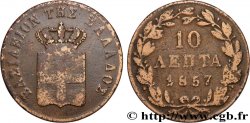
 Descrittivo
Descrittivo

